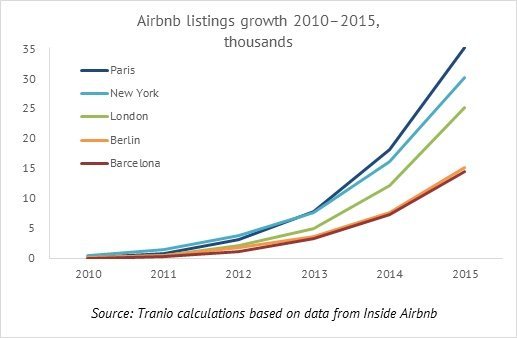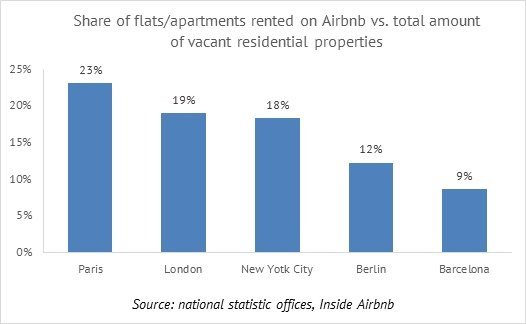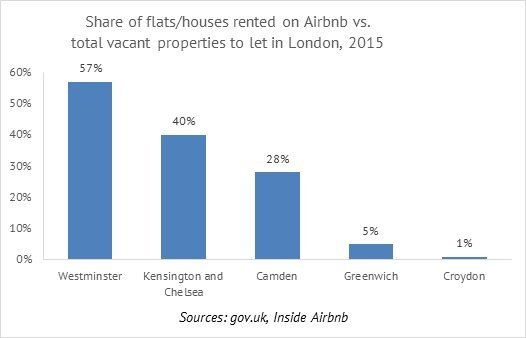Airbnb: a game-changer for the commercial property market
Internet access has changed the real estate industry. Airbnb, a San Francisco
Key points:
- 100,000+ listings in Paris, New York, London, Berlin, Barcelona
- strongest growth in lettings and listings in Paris, France
- 57% flats in London’s Westminster rented out via Airbnb
6–7% yields on Airbnb rentals vs.3–4% onlong-term lettings- 34,000 cities in the world with property listed on Airbnb
From digital reality to democratic scandal
Tensions over Airbnb hit a critical moment this year, when unhappy residents of San Francisco, where Airbnb was founded, voted in November 2015 on whether to limit Airbnb in the city. The authors of "Proposition F" contained the following restrictions on Airbnb activity:
- 75-night limit on renting property per year regardless of the property owners' presence. Currently SF limits property rental in the absence of owners to 90 nights per year, with no limit in their presence.
- quarterly tax declarations by landlords on the number of nights the property was rented.
In line with the city’s progressive reputation, 55% voted "no" to the amendments, mostly because Airbnb rentals guarantee high yields in overheated markets like San Francisco.
“Proposition F” aimed to tackle the falling

But San Francisco residents are not the only ones to face this new "digital" reality, complaints in Barcelona are mounting too. In August 2015, the city's mayor Ada Colau attacked Airbnb and Booking.com: “an internet platform cannot become a means to thwart the regulations and to shelter illegal tourist apartments. In that case we do have to intervene very forcefully".
There have been several protests against mounting
As discontent grows in the ranks of local authorities, neighbourhood associations and industry professionals, outfits like Airbnb and Uber are being targeted as the culprits but are the accusations founded? The answers are in the figures.
Bigger cities have bigger Airbnb markets
Airbnb emerged in 2008 and gained almost immediate popularity with tourists. The website currently hosts listings in 34,000 cities worldwide thanks to a simple and appealing business model: rent a flat or a room on a per day basis. Yields are twice to three times higher than the monthly standard for rentals of 30 days and more.
Paris, New York, London, Berlin and Barcelona emerge as market leaders after listings skyrocketed from nothing to over 100,000 in total over just five years. A key feature explaining the success is the number of tourists that visit a city every year. All these cities, but Berlin, ranked in the top ten destination cities by International Overnight Visitor in MasterCard’s 2015 Global Destinations Cities Index. Berlin was twentieth in the rating.

However, smaller cities are less affected: the share of flats listed on Airbnb is relatively low compared to the total amount of vacant properties to let on the market. For instance, the proportion of flats to rent via Airbnb only compose 6% and 3% of the total vacant rental property in Austin (TX) and Nashville (TN), music meccas for American culture; in New York City, it’s 18%.

What is more, the “Airbnb effect” is located in specific neighbourhoods of cities, typically those near tourist attractions. This is particularly visible in London where Westminster is the capital of

A staggering 57% of vacant property to let in the central district of Westminster is rented out via the online portal, compared to a mere 1% in the less attractive borough of Croydon and 5% in upmarket Greenwich.
Budgets hotels are most at risk
In terms of revenue, Airbnb is a boon for investors. Yields are
Research by the Boston University School of Management, revised in 2015, showed that in Texas (where the online portal is particularly popular), Airbnb did not affect business or luxury hotels. However, the budget hotel segment saw revenue cut by 5% over
Airbnb rental property also distinguishes itself by the relatively
Laws and taxes are bound to catch up
“Airbnb and similar websites do affect rental property markets in big cities, but we expect lobbying by residents and authorities activity to result in new laws, particularly in terms of taxation. Some of these measures are coming into effect right now. In Barcelona, for instance, Airbnb rentals must be registered with the local authorities, or the owners get a €3,000 fine. So while investors are right to consider this option, they need to keep on top of the law, which could change at any time,” advises Marina Filichkina, director of sales at Tranio.
These
Ivan Chepizhko, Tranio
Originally published by OPP.com
We will send you a content digest not more than once a week